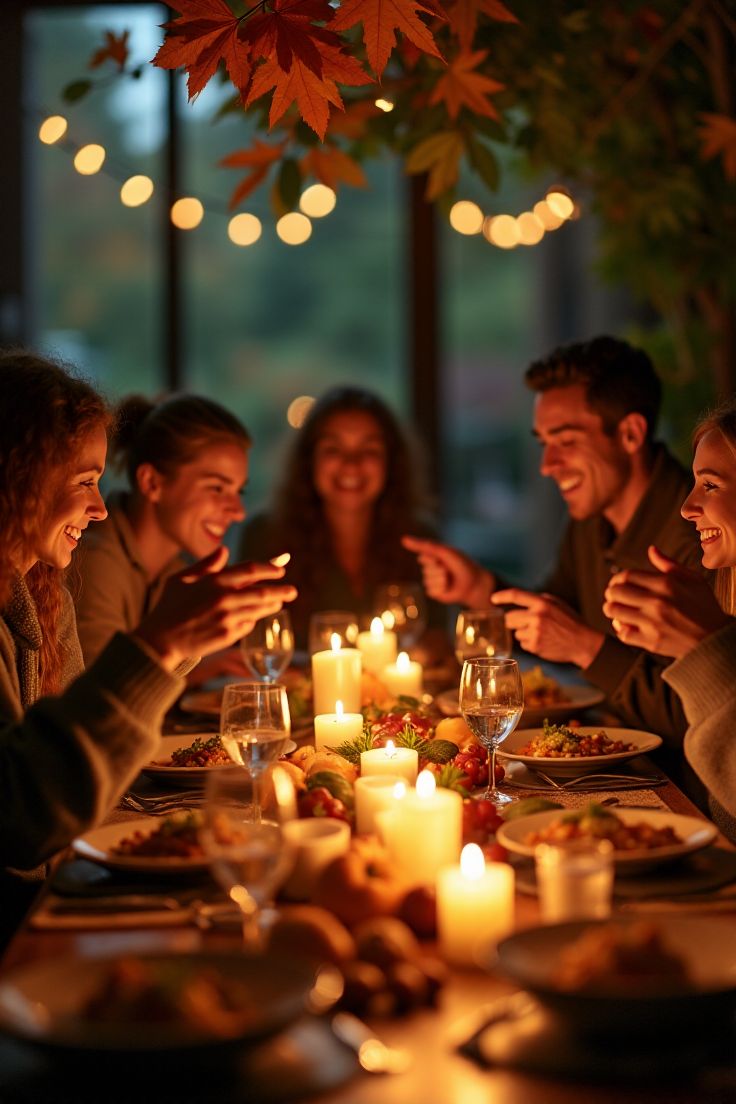
This blog post explores how showing gratitude can deepen emotional bonds, improve our mental well-being, and create a sense of connection with those we care about. Join us as we delve into the many ways gratitude can enhance our daily lives and relationships!
Gratitude Enhances Emotional Bonds

Showing gratitude can bring people closer together. When we express thanks, it strengthens our connections.
Simple acts, like saying “thank you,” create positive feelings. These moments build trust and make relationships warmer.
Feeling appreciated makes both sides more likely to support each other. The bond deepens when we recognize the good in one another.
Gratitude fosters understanding and respect, making our relationships richer. When we share our appreciation, we open up pathways for deeper conversations and shared experiences.
Understanding the impact of gratitude on relationships can enhance our connections with others. Below is a table outlining the benefits of expressing gratitude in relationships:
| Aspect | Benefit |
|---|---|
| Understanding | Enhances empathy and emotional connection. |
| Respect | Builds trust and fosters mutual respect. |
| Communication | Encourages open and honest dialogue. |
| Shared Experiences | Promotes bonding through shared gratitude. |
| Emotional Well-being | Increases overall happiness and satisfaction. |
| Conflict Resolution | Facilitates resolving disagreements amicably. |
This practice encourages us to focus on the positives, reinforcing our emotional ties.
Creating Shared Experiences
Creating memories together is a great way to strengthen bonds. Whether it’s a short trip, a fun activity, or simply cooking a meal side by side, these shared moments matter.
Strengthening bonds through shared experiences creates lasting memories. Here are some meaningful ways to create those moments together:
- Plan a weekend getaway to a nearby destination and explore new places together.
- Engage in a fun cooking challenge, experimenting with new recipes and techniques.
- Participate in a local workshop or class to learn a new skill as a team.
- Set aside time for a game night, where friendly competition brings laughter and joy.
- Take leisurely walks or hikes, enjoying nature while having deep conversations.
Engaging in new experiences allows people to connect on a deeper level. When couples enjoy adventures or even face challenges together, they build a stronger foundation for their relationship.
Sharing new experiences builds excitement and joy. It gives partners stories to tell and moments to reflect upon later.
Having fun together also boosts happiness. These positive interactions encourage laughter and light-heartedness, which are vital for a healthy relationship.
It’s important to try things that are new and different for both people. This could mean taking a class, exploring a new restaurant, or hiking a trail you’ve never been on.
The key is to find activities that both people enjoy. When partners actively participate in each other’s interests, it creates a bond based on mutual appreciation.
Discussing the experiences afterward can also strengthen connections. Sharing thoughts about what was fun or challenging brings partners closer.
This communication deepens understanding and brings clarity to the relationship.
Ultimately, the little moments spent together make the biggest impact.
They serve as reminders of why two people care for each other. Engaging in shared experiences can lead to lasting memories and a stronger emotional connection.
Fostering Empathy and Understanding
Empathy and understanding are key elements in building strong relationships. When we take the time to see things from another person’s point of view, we create deeper connections.
Listening is a crucial part of this process. By giving our full attention to someone when they speak, we show that we value their thoughts and feelings.
Asking questions can also help. When we inquire about someone’s feelings or experiences, it shows our interest in their life.
This can lead to more open conversations, allowing both parties to express themselves freely.
Sharing our own experiences can foster a sense of connection as well.
By being open about our feelings, we invite others to do the same. This mutual sharing creates a safe space where emotional bonds can grow stronger.
Practicing gratitude plays a significant role in empathy. When we express appreciation for someone, we acknowledge their efforts and contributions.
This simple act helps to cultivate kindness and understanding in the relationship.
Empathy is more than just sympathy; it’s about truly feeling what another person feels.
When we practice empathy, we can navigate conflicts better and respond to each other’s needs more effectively. This, in turn, strengthens the connection, making relationships more fulfilling and meaningful.
Building Trust Through Acknowledgment
One way to build trust in a relationship is through acknowledgment. When you recognize what someone else has done, it shows that you see their efforts.
This simple act can make a big difference in how people feel about each other.
When you acknowledge someone’s contributions, you create a feeling of being valued.
For example, saying “I appreciate your help” or “You did a great job” can make others feel special. This helps people to open up and feel safe in sharing their thoughts and feelings.
Acknowledgment also encourages more positive interactions. When we notice the good things in each other, it can lead to more kindness and appreciation.
This creates a cycle of trust and support. Everyone feels better when they know their efforts are recognized.
Additionally, consistent acknowledgment fosters a deeper emotional bond. The more you thank someone or highlight their strengths, the stronger your connection becomes.
It lays a foundation where both parties feel secure and understood.
By taking the time to express appreciation and acknowledgment, you help create a trusting environment.
This leads to more open communication and strengthens the overall relationship.
Practicing Gratitude in Daily Life

Write down three things you are thankful for each day. This helps shift your focus from what you lack to the positive aspects of your life.
It can be anything from a sunny day to a kind word from a friend.
Another way to incorporate gratitude is by expressing thanks directly to others.
Whether it’s a family member, friend, or even a coworker, let them know you appreciate their efforts. A heartfelt “thank you” can brighten someone’s day and strengthen your bond.
Expressing gratitude is a simple yet powerful way to enhance relationships. Here are some points to consider when showing appreciation:
- Recognize specific actions: Mention what they did that you appreciate, making your gratitude more personal.
- Choose the right moment: A sincere thank you is most impactful when delivered at the right time, like after completing a project.
- Be genuine: Authenticity matters; let your emotions show, ensuring they feel your appreciation truly.
- Follow up: Consider sending a thank-you note or message as a lasting reminder of your gratefulness.
- Encourage others: Promote a culture of gratitude within your community or workplace, inspiring others to show appreciation too.
Taking moments to reflect on your day before sleep can also be beneficial. Think about what made you smile or feel good.
This practice can improve your mood and create a sense of peace.
Sharing your gratitude with others can enhance connections.
You might consider initiating a gratitude ritual with friends. Set aside time to share what you appreciate about one another.
This builds positivity and deeper emotional ties.
Gratitude can also be practiced in the way you approach everyday challenges.
When faced with a difficult situation, try to find aspects you can be thankful for. This can help you maintain a more positive mindset and cope better.
By making gratitude a regular part of your routine, you can cultivate a more fulfilling life. The simple act of acknowledging the good things around you can lead to stronger relationships and a deeper sense of happiness.
Starting a Gratitude Journal
This will be your dedicated space to write down what you are thankful for. You don’t need to write long entries; just a few sentences each day will do.
Gratitude is a powerful practice that can enhance your well-being. Use this space to cultivate positivity in your life by reflecting on what you’re thankful for each day.
- Focus on the small things that bring you joy.
- Write at least one positive experience from your day.
- Express gratitude for the people in your life.
- Include moments of joy, even if they’re fleeting.
- Revisit your entries to remind yourself of the good in your life.
Pick a specific time for journaling, such as in the morning or before bed. Consistency helps make it a habit.
Each day, write down three things that made you feel grateful. These can be small, like enjoying a tasty meal, or big, like a supportive friend.
Don’t worry about writing perfectly. The focus should be on your feelings and experiences.
If a specific person or event stands out, take a moment to elaborate on why it matters to you. This can deepen your appreciation and connect you more to those moments.
Rereading your entries can also be helpful. Looking back on what you’ve written can help remind you of the positivity in your life, especially during tough times.
The act of writing itself can boost your mood and enhance your overall happiness.
As time goes on, you may find new patterns in what you appreciate most.
This insight can inspire changes in your life, leading you to seek out more of what you love. A gratitude journal helps you focus on the good, making it a powerful tool to strengthen your emotional connections with others and yourself.
Expressing Thanks in Conversations
A simple “thank you” can go a long way in brightening someone’s day. It also sets a positive tone, making the conversation feel more friendly.
Using specific examples can enhance your expression of gratitude. Instead of just saying thank you, mention what they did that was helpful.
For instance, “Thank you for helping me with my homework last night, I really appreciate it! This makes your thanks feel more personal and sincere.
When expressing gratitude, it’s important to personalize your message. Here are some points to consider when crafting your thank you notes:
- Be specific about what you are thankful for.
- Include a detail that shows your appreciation was meaningful.
- Acknowledge the effort the person made to help you.
- Express how their help has positively impacted you.
- Invite them to continue the relationship or offer help in return.
Timing matters too. Express your gratitude right after someone helps you or offers a kind gesture.
This reinforces the positive feelings for both parties. When you thank someone in the moment, it shows that you truly recognize their effort.
Body language also plays a role in how your thanks are received. Making eye contact and smiling while you express gratitude can enhance the warmth of your message.
It makes the other person feel appreciated on a deeper level.
Using gratitude during conversations helps build stronger bonds.
It creates an atmosphere of kindness and respect, reinforcing your connection. When partners regularly express thanks to each other, it can lead to greater happiness in the relationship.
Encouraging friends and family to share their thanks can create a culture of appreciation. When everyone participates, it strengthens the overall connection within the group.
This simple act can transform ordinary interactions into meaningful ones.
Finally, remember that gratitude doesn’t have to be reserved for big gestures.
Acknowledging everyday kindnesses can make a significant difference. Whether it’s someone holding the door for you or a friend listening to your problems, every little thank you counts.
Setting Daily Gratitude Reminders
Choose moments when you can pause and reflect. Maybe it’s during breakfast, lunch, or before bed.
You might decide to set a reminder for the morning. When you wake up, take a moment to think of one thing you’re grateful for.
It could be as simple as a good night’s sleep or a sunny day ahead.
Another idea is to have a midday reminder.
This can help you pause and appreciate something positive that has happened so far. You might think of a compliment from a friend or a nice gesture you received at work.
Lastly, an evening reminder can work wonders. Before you go to sleep, reflect on your day and recognize the positives.
This practice can help you finish your day on a happy note.
Consistency is key.
The more you remind yourself to practice gratitude, the more natural it becomes. As you regularly acknowledge what you appreciate, you may start to notice stronger connections with others.
Recognizing the good in your life helps build a foundation for deeper emotional bonds.
Building deeper emotional connections is essential for personal growth and fostering meaningful relationships. Recognizing the positive aspects of our lives plays a crucial role in this process. Here are some key points to consider:
- Enhances gratitude and appreciation for the people and experiences around us.
- Encourages open communication, allowing individuals to express their feelings more freely.
- Strengthens resilience during challenging times by focusing on the positives.
- Promotes empathy by understanding and valuing others’ contributions to our happiness.
- Fosters a more positive outlook, leading to improved mental health and well-being.
The Long-Term Benefits of Gratitude

This positivity not only lifts your spirits but also influences how you view the world around you. With time, this shift in perspective can lead to a more optimistic outlook on life.
Moreover, gratitude can improve your overall mental health. People who regularly express thanks often experience lower levels of stress and anxiety.
When you focus on the good things in your life, it makes challenges feel less overwhelming. This mental resilience can foster a sense of stability and peace.
In relationships, expressing gratitude plays a huge role. Long-lasting partnerships are built on acknowledgment and appreciation.
When you regularly express thanks to your partner, you create an environment of love and support. This leads to deeper emotional connections, making both individuals feel valued and understood.
Additionally, gratitude has been linked to better physical health. People who practice gratitude tend to take better care of themselves.
They may exercise more, eat healthier, and get regular check-ups. This improved well-being can result in a longer, healthier life.
With all these benefits, it’s clear that making gratitude a part of your daily routine can bring positive change over time. Whether through journaling, expressing thanks, or simply pausing to reflect, these small acts create a ripple effect that enhances every aspect of your life.
Strengthening Relationships Over Time
When partners continually acknowledge each other’s contributions, it builds a strong foundation of trust and respect. Simple words like “thank you” or “I appreciate you” can make a significant impact.
Sharing moments together is equally important. Doing things that both people enjoy creates lasting memories.
Whether it’s trying a new restaurant, watching a movie, or taking a walk, these shared activities help deepen emotional connections.
Listening actively and showing empathy also plays a role in strengthening relationships.
When you listen carefully to your partner’s feelings and thoughts, it shows you care. This understanding allows for better communication and resolves conflicts more easily.
In addition, setting aside regular time to talk about your feelings can help keep the relationship healthy. Conversations about what each partner needs or enjoys can lead to improvements that strengthen the bond.
Gratitude can act as a powerful glue. Thanking each other for small gestures builds a positive atmosphere.
The more both partners feel appreciated, the more they want to support one another.
As time goes by, these practices create a cycle of love and respect.
Open communication, shared experiences, and gratitude build a solid relationship. With consistent effort, partners can enjoy a deeper, more fulfilling connection.
Boosting Mental Well-Being Together
Simple expressions of thanks can make us feel valued, which enhances our mental health.
Engaging in gratitude allows partners to connect on a deeper level.
Expressing gratitude can significantly improve our relationships and mental well-being. Here are some key points to consider:
- Gratitude fosters positive emotions and helps combat feelings of negativity.
- Simple acts of thanks can strengthen emotional bonds between partners.
- Regularly expressing appreciation can increase relationship satisfaction.
- Engaging in gratitude can create a more supportive and understanding environment.
- Practicing gratitude helps individuals develop a more optimistic outlook on life.
When we recognize and celebrate one another’s efforts, it builds trust and kindness in the relationship. This mutual appreciation nurtures a positive atmosphere, reducing stress and anxiety.
Spending time reflecting on good moments strengthens emotional ties. Whether it’s recalling a kind gesture or a fun memory, these reflections help lift spirits.
Practicing gratitude regularly can change how we view challenges, making them feel less daunting.
In a partnership, taking time to express appreciation can lead to happier interactions.
Asking each other to share what they are thankful for can open up important conversations and deepen understanding. As partners notice the good in each other, it creates a cycle of positivity.
Ultimately, the little acts of gratitude shared can greatly impact both individuals. Together, they create an environment filled with support, happiness, and mental well-being.
It’s about celebrating life’s small blessings together and nurturing the bond that strengthens their relationship.
Encouraging Reciprocal Kindness
This simple act can make your relationships stronger and more meaningful.
One way to encourage this kindness is by being the first to show it.
Start small by offering a compliment or helping someone with a task. These small gestures can spark a chain reaction.
When others see your kindness, they may feel motivated to pay it forward.
Also, expressing gratitude plays a big part in fostering this cycle.
When you thank someone for their kindness, it not only acknowledges their effort but also encourages them to continue being kind. Let them know how their action made you feel appreciated.
This acknowledgment can strengthen your connection.
Sharing your own acts of kindness can inspire others too.
When you talk about helping someone or doing something thoughtful, it showcases the positive impact it can have. Friends and family are more likely to join in when they see the joy that kindness brings.
It’s essential to emphasize that kindness doesn’t have to be grand or expensive. Little things, like holding the door open for someone or offering a smile, can go a long way.
The more consistently you practice these small acts, the more you create an environment where kindness thrives.
By encouraging mutual support and gratitude, you make your circle feel more connected.
As people uplift each other, they build stronger emotional ties, leading to happier, healthier relationships. This ripple effect of kindness brings joy not just to individuals but enhances the spirit of the entire group.
Frequently Asked Questions
Here are some frequently asked questions regarding the content of the blog post on gratitude and relationships.
What are the benefits of expressing gratitude in relationships?
Expressing gratitude has several significant benefits for relationships. It enhances empathy and emotional connection between partners, allowing them to better understand each other’s perspectives. Furthermore, it builds trust and fosters mutual respect, which are crucial elements for any healthy relationship.
Gratitude also encourages open communication, paving the way for honest dialogue. Additionally, it promotes bonding through shared experiences, as partners feel more connected when they acknowledge the good in each other.
How can shared experiences strengthen emotional bonds?
Creating shared experiences is a powerful way to strengthen emotional bonds between partners. Engaging in new activities together, such as cooking, traveling, or participating in local workshops, creates lasting memories that deepen connections. These moments of joy and fun add excitement to the relationship and allow partners to connect on a more profound level.
Moreover, shared experiences provide opportunities for open communication, whether through discussing challenges faced together or reflecting on enjoyable moments. Such interactions not only reinforce emotional ties but also build a strong foundation for the relationship as partners grow closer.
How does practicing gratitude daily impact mental well-being?
Practicing gratitude daily can significantly enhance mental well-being. It involves shifting focus from what is lacking to the positive aspects of life, which can lead to lower stress and anxiety levels. By regularly acknowledging the good things around us, individuals can foster a more optimistic outlook on life and improve overall happiness.
Additionally, gratitude helps reinforce emotional connections with others, creating a supportive environment that nurtures mental health. This practice can instill a sense of peace and stability in one’s daily routine.
What role does empathy play in building strong relationships?
Empathy is a critical element in fostering strong relationships as it allows individuals to understand and share the feelings of others. When partners actively listen and try to see things from each other’s perspectives, it creates a deeper emotional connection and enhances communication. This understanding helps in navigating conflicts effectively and responding to each other’s needs.
Moreover, practicing gratitude alongside empathy cultivates kindness, fostering a respectful and supportive environment in the relationship. Together, these qualities strengthen emotional ties and make relationships more fulfilling.
What are some practical ways to express gratitude regularly?
There are several practical ways to express gratitude regularly in relationships. Simple acts like saying “thank you” for specific actions can create a sense of appreciation. Writing thank-you notes or sending messages of appreciation can also be meaningful ways to acknowledge efforts and contributions.
Additionally, initiating gratitude rituals with friends or loved ones, such as sharing what you appreciate about one another, can enhance connections and promote a culture of gratitude. Regularly taking time to reflect on positive experiences can further reinforce this habit.
How can couples nurture gratitude to strengthen their relationship?
Couples can nurture gratitude by consistently acknowledging each other’s contributions and efforts. Simple affirmations like “I appreciate you” can significantly impact emotional connection and build trust. Moreover, sharing experiences and discussing what each partner values in the relationship fosters understanding and respect.
Taking time to talk about feelings and expressing gratitude for small gestures creates a cycle of positivity. As both partners feel valued and appreciated, a supportive and loving environment flourishes within the relationship, leading to a deeper connection over time.
Conclusion
Simple acts like saying “thank you” or recognizing each other’s efforts can lead to a supportive and loving atmosphere.As you make gratitude a part of your daily life, you’ll notice a positive shift in how you connect with others.
This cycle of appreciation not only strengthens relationships but also promotes mental well-being and resilience. Remember, it’s the small moments of gratitude that can make the biggest difference.
Embrace these practices and watch your connections flourish.






